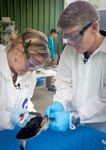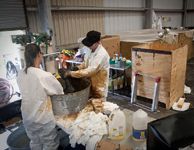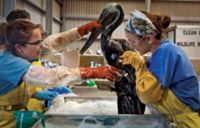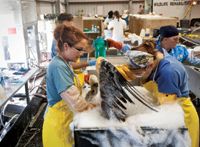Crisis on the gulf: Veterinarians help
During ongoing Gulf oil spill, UC-Davis' Oiled Wildlife Care Network lends helping hand in Louisiana
Davis, Calif. — As oil continues to pour into the Gulf of Mexico at a rate of 25,000 or more barrels a day, veterinarians, volunteers and animal experts like Dr. Michael Ziccardi are doing their best to make sure the impact on wildlife is minimal.

The clean-up: Of the 315 sea turtles verified in the oil spill, only 41 survived and are in rehabilitation. In this photo, Dr. Michael Ziccardi (right), DVM, PhD, of the University of California-Davis work with rescuers at the Louisiana Marine Mammal and Sea Turtle Rescue Center in New Orleans.
Ziccardi, a veterinarian and director of the Oiled Wildlife Care Network (OWCN), was initially contacted by Rhonda Murgatroyd, wildlife branch director working for O'Briens Spill Management.
"They were in need of someone to head up marine mammal and sea turtle operations for the spill," said Ziccardi, who is based at the University of California-Davis.
Dr. Heidi Stout, with Tri-State Bird Rescue, was already in place to deal with the oiled birds.
"I spoke directly with Dr. Teri Rowles, director of NOAA's (National Oceanic and Atmospheric Administration) Marine Mammal Health and Stranding Program, and she enthusiastically agreed that I should go and assist," Ziccardi said during a quick trip home to California.
In Louisiana, Ziccardi is working under the Unified Command which includes the Coast Guard, state agencies and BP. He is also helping to coordinate efforts on behalf of NOAA, National Marine Fisheries Service and the U.S. Fish and Wildlife Service for collection and care of sea turtles and marine mammals — whales, dolphins and manatees.

Groups converge on the Gulf: More than 200 organizations have been involved in various aspects of the care of wildlife. To date, more than 442 birds have been visibly oiled and captured alive, including Brown Pelicans as the photos depict from the Louisiana Marine Mammal and Sea Turtle Rescue Center in New Orleans.
In the past month, he and his team have set up four complete primary care centers for oiled turtles three of which can also be used for dolphins — re-worked protocols, developed care guidelines, rescued turtles, recovered dolphins, all while tackling a long list of administrative duties.
Ziccardi and his team have collected both turtles and dolphins. At the end of May, the group found three live, externally oiled turtles (two Kemp's Ridleys and one loggerhead); 12 externally unoiled live turtles (two have since died); and 200 dead externally unoiled turtles. Also, 20 dead, externally unoiled dolphins were collected.
After necropsies on 67 turtles, no oil was noted in or on any of them, according to Ziccardi.
More than 200 organizations have been involved in various aspects of animal care — staffing command centers and working in the field, Ziccardi wrote in a blog.

While no UC Davis veterinary students have traveled to Louisiana, Ziccardi said many have contacted him about helping. "If the spill expands, we hope to get additional assistance from key people, and veterinary students from UCD are at the top of that list," he said.
OWCN was established in 1994 by the Department of Fish and Game's Office of Spill Prevention and Response after the Exxon Valdez oil spill in Alaska. It is run by the UC-Davis campus's Wildlife Health Center in the School of Veterinary Medicine. Ziccardi helped write the national guidelines for marine mammal oil spill response for the NOAA.

Dr. Greg Massey in Gulf Port, Miss. remains very active with rescue efforts.
Training programs and preparations for dealing with oil spills continue year-round at UC-Davis.

"UC-Davis' Oiled Wildlife Care Network provides annual training to our 29-member organizations and agency partners throughout the state," Ziccardi said. "We also conduct training outside the state as requested, and funded, by other parties, including a comprehensive training program for all marine mammal stranding networks country-wide that was done several years ago."
For regular updates on Ziccardi and his team's work in the Gulf of Mexico, visit http://owcnblog.wordpress.com.
